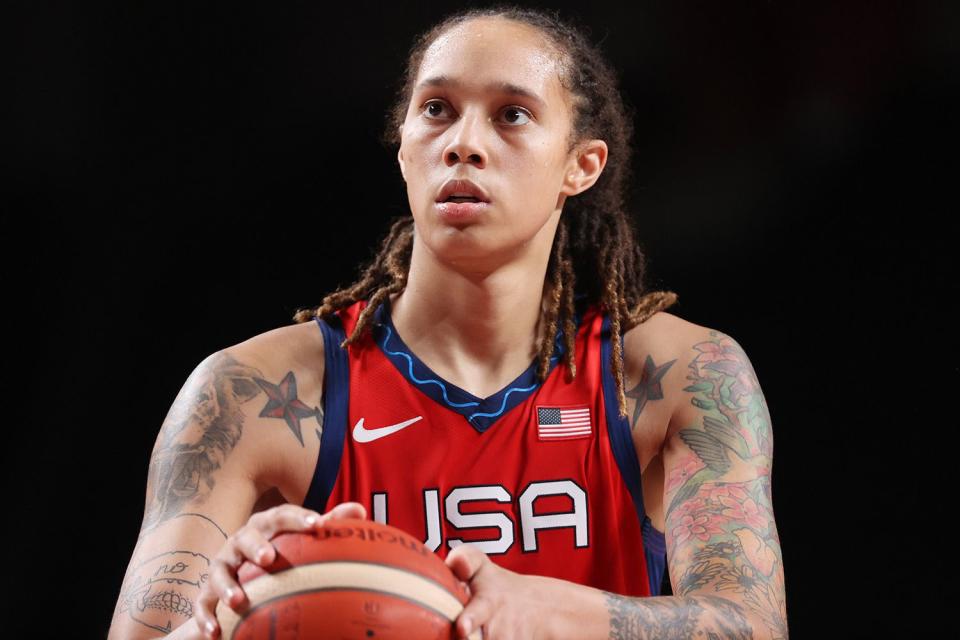Understanding Brittney Griner's Identity: Is Brittney Griner Transgender?
In the world of sports, few names resonate as powerfully as Brittney Griner. As a professional basketball player, her achievements are monumental, but her journey transcends the court. Griner's life story, marked by both triumph and adversity, has sparked discussions about identity, gender, and societal norms. One question that frequently arises in these discussions is, "Is Brittney Griner transgender?" This inquiry is not simply about labels; it touches on the deeper understanding of gender identity and the societal perceptions surrounding it.
The conversation about Griner's gender identity is set against a backdrop of increasing visibility and acceptance of transgender individuals in society. As a prominent figure, her experiences can help illuminate the challenges faced by many in the LGBTQ+ community. In an era where discussions about gender fluidity and identity are becoming more mainstream, understanding Griner's position within this context is crucial. This article aims to explore her identity, the implications of her experiences, and the broader conversations surrounding gender in sports.
As we delve into the topic, it’s important to approach it with sensitivity and an open mind. Griner’s story is not just about her identity but also about the societal structures that influence our understanding of gender. Therefore, examining the question "Is Brittney Griner transgender?" is not only about her but also about how we as a society view and classify gender identities. With this in mind, let’s explore the various facets of Brittney Griner’s life and identity.
Who is Brittney Griner?
Brittney Griner is a professional basketball player who has made significant contributions to women's sports. Born on October 18, 1990, in Houston, Texas, she has captured the attention of fans worldwide not only for her skills on the court but also for her outspoken nature regarding social issues, particularly those affecting the LGBTQ+ community.
Brittney Griner's Biography
| Detail | Information |
|---|---|
| Full Name | Brittney Yevette Griner |
| Date of Birth | October 18, 1990 |
| Place of Birth | Houston, Texas, USA |
| Height | 6 ft 9 in (2.06 m) |
| Position | Center |
| College | Baylor University |
| WNBA Draft | 2013, 1st overall pick |
| Teams Played For | Phoenix Mercury |
What is Brittney Griner's Gender Identity?
Understanding whether Brittney Griner is transgender requires examining her own declarations and experiences. Griner has openly identified as a lesbian and has been an advocate for LGBTQ+ rights. However, she has not identified as transgender. Her openness about her sexual orientation has contributed to her role as a leading voice in the fight for equality in sports and beyond.
Has Brittney Griner Ever Discussed Her Gender Identity?
Griner's discussions about her identity have primarily focused on her experiences as a Black woman in sports and her sexual orientation. She has been candid about the challenges she has faced due to her height, sexuality, and race. While she has shared her personal journey regarding her sexuality, she has not stated that she is transgender. Instead, she embraces her identity as a woman and an athlete.
What Challenges Has Brittney Griner Faced?
The journey of Brittney Griner has not been devoid of challenges. As a prominent figure in the WNBA, she has often encountered scrutiny and prejudice, both on and off the court. Some of the challenges she has faced include:
- Discrimination: Griner has faced discrimination based on her sexual orientation and physical appearance, which has often put her in the public eye.
- Media Scrutiny: The media has sometimes misrepresented her identity, leading to misunderstandings about who she is.
- Pressure to Conform: As a high-profile athlete, Griner has felt the pressure to conform to traditional gender roles and expectations.
How Has Griner Contributed to LGBTQ+ Advocacy?
Brittney Griner has used her platform to advocate for LGBTQ+ rights and representation in sports. Some of her contributions include:
- Speaking Out: Griner has often spoken out against discrimination and for equality, using her voice to uplift marginalized communities.
- Visibility: By being open about her sexual orientation, she has increased visibility for LGBTQ+ athletes, encouraging others to embrace their identities.
- Engagement with the Community: Griner participates in events and initiatives that support LGBTQ+ rights, providing mentorship and support for young athletes.
Is Brittney Griner's Story Unique?
While Brittney Griner's story is certainly unique due to her achievements and visibility, it reflects a larger narrative within sports and society. Many athletes face similar challenges regarding their identity, and Griner's experiences resonate with those navigating their own journeys. Her candidness and advocacy have contributed to a more inclusive dialogue around gender and identity in athletics.
What Can We Learn from Brittney Griner?
Brittney Griner's journey offers invaluable lessons about authenticity, resilience, and the importance of representation. Key takeaways include:
- Embrace Your Identity: Griner's openness encourages individuals to embrace their identities and not shy away from who they are.
- Advocate for Change: Her advocacy reminds us that using our platforms can lead to meaningful change and awareness.
- Support One Another: The importance of community support is evident in Griner's story, highlighting the need for allies in the fight for equality.
Conclusion: Is Brittney Griner Transgender?
In conclusion, the question "Is Brittney Griner transgender?" can be answered with clarity: Brittney Griner identifies as a woman and a proud member of the LGBTQ+ community but has not identified as transgender. Her journey as a professional athlete has been marked by both significant achievements and challenges, and her advocacy for LGBTQ+ rights continues to inspire many. Griner's story is a testament to the power of authenticity and the importance of embracing one's identity in the face of adversity.
Article Recommendations
- Unveiling The Mystique Forbes Trudeau Net Worth
- Exploring The Life Of Anthony Ramos Daughter A Glimpse Into Their Bond



Detail Author:
- Name : Lilian Beatty
- Username : kenyon36
- Email : bernhard.felipa@gmail.com
- Birthdate : 1980-09-20
- Address : 893 Jena Mills Lake Candidahaven, OK 69549-7246
- Phone : (283) 307-9655
- Company : Hagenes, Boyle and Boyer
- Job : Paperhanger
- Bio : Optio aut expedita suscipit qui ratione in. Et autem et ut est. Tempore alias nihil est non reprehenderit et vel.
Socials
twitter:
- url : https://twitter.com/arvel.torphy
- username : arvel.torphy
- bio : Voluptatum laudantium et quaerat dolorem. Officia in voluptas quaerat illum aspernatur ut tempore.
- followers : 4417
- following : 2367
instagram:
- url : https://instagram.com/arvel_torphy
- username : arvel_torphy
- bio : Enim voluptatibus sed et minima. Tempora voluptate vero enim ea quia quia rerum.
- followers : 4067
- following : 1320
tiktok:
- url : https://tiktok.com/@arvel_real
- username : arvel_real
- bio : Sit ullam deleniti qui.
- followers : 479
- following : 390
linkedin:
- url : https://linkedin.com/in/torphy2020
- username : torphy2020
- bio : Qui fuga autem ea dolorem.
- followers : 5094
- following : 1220
facebook:
- url : https://facebook.com/arveltorphy
- username : arveltorphy
- bio : Assumenda omnis sit tenetur et sed adipisci sit laborum.
- followers : 3995
- following : 2031